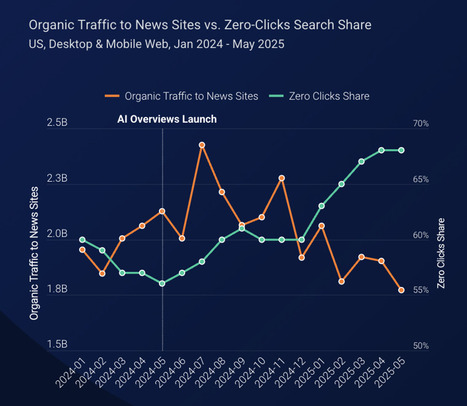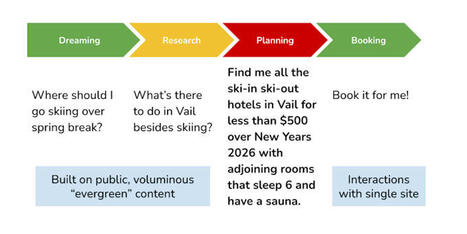 Your new post is loading...
 Your new post is loading...

|
Scooped by
Roland Schegg
July 17, 1:06 AM
|
The rapid rise of generative AI is completely reshaping how travelers find hotels and resorts online. Gone are the days when traditional search engine results were the only gatekeepers. Today, guests increasingly ask AI-powered chatbots and smart search tools direct questions, receiving instant, conversational responses.
This shift demands more than just traditional SEO. It calls for a smarter, more targeted approach: Generative Engine Optimization (GEO).

|
Scooped by
Roland Schegg
July 17, 1:01 AM
|
Accor is working through a significant digital transformation that includes a new customer relationship management system, reservation system and property management tech.
The France-based hotel giant believes the overhaul will enable it to better serve guests who are now looking for an experience, according to Alix Boulnois, chief commercial, digital and technology officer for the group.
During an interview at Phocuswright Europe 2025, Boulnois shared how far the company can go with existing technology but stressed the challenges, including system fragmentation, data silos and mindset.
“I think the industry is trying to make a mindset shift—from being a service provider to guests to becoming an orchestrator of experiences,” she said.
Hotel general managers are also part of the mindset shift and Boulnois stressed how much their roles had changed in the past 10 years.

|
Scooped by
Roland Schegg
July 17, 12:33 AM
|
"AI won’t replace frontline travel roles, but by supercharging developer productivity, it’s reshaping how the entire industry hires, innovates, and grows.
The travel industry is once again standing at the edge of a major technological transformation. Just as the rise of online booking platforms redefined travel agencies in the early 2000s, the advent of AI, particularly agentic and generative AI, may soon redraw the talent landscape across the travel sector.
To get a better understanding of how the latest developments in AI are affecting employment in the travel industry particular, Skift Research undertook an analysis of government employment data to see what we could learn from past technological disruptions, and what upcoming shifts we can anticipate in the near future."

|
Scooped by
Roland Schegg
July 15, 11:05 AM
|
Vor mehr als dreizehn(!) Jahren hat IHA-Hauptgeschäftsführer Markus Luthe einen Artikel zur Zukunft der Hotel-Distribution verfasst, in dem er nach einem „HotelWiki“ rief. Vielleicht bietet KI nun einen neuen Ansatz für ein globales HotelWiki als Ausweg aus dem Gefangenendilemma?
In Ihrem Gastblog „Winning the AI Era: How Hotels Can Break Free from OTA Dependence“ analysieren Steve Kaufer (Mitgründer von Tripadvisor), Richard Holden (ehem. VP Product bei Google) und Sanjay Vakil (Mitgründer von DirectBooker), wie Künstliche Intelligenz die Vertriebsmacht von Online-Buchungsplattformen (OTAs) infrage stellen kann. Die Botschaft ist klar: Die KI-Ära bietet Hoteliers eine historische Chance, das Reiseökosystem zugunsten der direkten Anbieter zu verschieben. Aber dieses Zeitfenster wird nicht sehr lange offen bleiben. Schnelles Handeln ist geboten, bevor sich das Verhalten der Reisenden verfestigt, exklusive Geschäftsverträge abgeschlossen werden und die OTAs zum Standardkanal der KI-Suche werden.

|
Scooped by
Roland Schegg
July 15, 3:38 AM
|
Dans un article publié le mois dernier, je vous parlais de Google et sa récente intégration de l’IA dans ses résultats de recherche – ce qu’on appelle communément les AI Overviews. En vertu d’une étude de la firme OneLittleWeb, analysant les comportements de recherche en ligne d’avril 2024 à mars 2025, on apprenait ainsi que les recherches via les moteurs traditionnels (Google, Bing et les autres) représentaient toujours une quantité 34 fois supérieure aux recherches via les chatbots d’IA tels que ChatGPT, Perplexity, DeepSeek, Gemini et Claude!
En termes de chiffres, ça représente quoi? Il s’est fait 1,863 milliards de recherches via les moteurs classique tels que Google durant la dernière année, comparativement à 55.2 milliards via les chatbots de recherche alimentés à l’IA générative. Bref, on se calme, Google continue de dominer. Right?
Les chiffres ne disent pas tout, comme on le sait bien. Et une autre étude, de la firme SimilarWeb celle-là, vient justement alimenter la discussion par rapport à ces fameux comportements liés à la recherche en ligne aujourd’hui.
LES NOUVELLES SE TROUVENT DE PLUS EN PLUS VIA L’IA
Vous croyez que ChatGPT se fera bientôt détrôner par une autre application? Détrompez-vous! La populaire plateforme développée par OpenAI continue sa progression fulgurante avec une hausse d’utilisateurs de 52% entre mai 2024 et mai 2025, soit durant la dernière année (12 mois). Cette progression est même de 112% durant la même période pour la version mobile de son application!

|
Scooped by
Roland Schegg
July 12, 7:13 AM
|
"How hotels across Europe are exploring artificial intelligence—where it’s working, what’s holding them back, and why the future depends on thoughtful integration
European hoteliers are cautiously optimistic about AI, recognizing its potential to enhance efficiency and guest experience. Yet, actual adoption remains limited, as many grapple with knowledge gaps, cost concerns, and integration challenges. A recent survey across six countries reveals that the industry is entering a phase of cautious experimentation, with a long road ahead to full strategic integration."

|
Scooped by
Roland Schegg
July 12, 6:35 AM
|
While European hotels are integrating artificial intelligence (AI), adoption is still fragmented.
According to a recent survey conducted by the University of Applied Sciences of Western Switzerland Valais (HES-SO Valais-Wallis), the interest is there, with hoteliers reporting AI can be useful for reservations (68%), marketing (62%), customer relationship management (51%) and data analysis (49%). However, only 41% of hotels said they're actually using AI, and 43% said they're not using it at all.
The survey, which is part of national research project Resilient Tourism, included responses from over 1,500 hotels in Austria, Germany, France, Greece, Italy and Switzerland.

|
Scooped by
Roland Schegg
July 11, 12:58 AM
|
"The G7/OECD policy paper on Artificial Intelligence and tourism highlights the potential to harness AI as a tool to promote innovation and the sustainable development of tourism. It discusses the opportunities and risks AI brings, and what this means for tourists, businesses, destinations and governments. Key policy issues are identified, including the need to: i) put in place robust data and consumer protection measures as AI is used to create personalised tourist experiences; ii) monitor the impact on tourism jobs and protect and prepare workers, as AI used to improve operational efficiency; and iii) support tourism businesses, and SMEs in particular, to keep pace with rapid AI developments and comply with evolving legal and regulatory frameworks, while fostering a dynamic environment for innovation."

|
Scooped by
Roland Schegg
July 10, 9:20 AM
|
Leisure travelers worldwide are increasingly turning to social media and artificial intelligence (AI)-powered sites, with use particularly prevalent in emerging markets, according to research from global consulting firm BCG.
The study included responses from approximately 5,000 travelers across Australia, China, India, Indonesia, Germany, Mexico, Nigeria, Saudi Arabia, the United Kingdom, the United States and Vietnam—all countries with populations that travel frequently or are expected to do so in the future. The company also analyzed travel patterns from 2014 through 2024 across 68 countries and developed forecast data through 2040.
The report highlighted opportunities in the expanding leisure travel sector, stressing the need for those in the industry to embrace AI. According to survey findings, leisure travel is expected to triple—from $5 trillion to $15 trillion—by 2040, with more of the "next wave" of travelers coming from emerging markets such as China, India, Saudi Arabia, and Vietnam, as opposed to more traditional destinations like Germany, the U.K. and the U.S.

|
Scooped by
Roland Schegg
July 10, 8:54 AM
|
WhatsApp is present in nearly 3 billion phones, making it one of the most used messaging applications across industries and areas, including hospitality and hotel guest communication.
But what makes it the right choice besides the amount of users? How to create a WhatsApp hotel communication strategy? And what role does it play in comparison to emails and SMS in hospitality?
These are all valid questions we will explore in this article.

|
Scooped by
Roland Schegg
July 8, 3:48 AM
|
"Google has proposed a revised search layout to comply with the EU’s Digital Markets Act (DMA), but new analysis reveals a potential bias: the new design tends to privilege large travel intermediaries like Booking.com over individual hotel properties. The solution, while technically fulfilling DMA requirements, may shift the balance—favoring aggregator platforms instead of empowering direct sellers like independent hotels.
Key takeaways
Aggregator-first visibility: Google’s “Option B” adds two stacked boxes under its search results: a vertical search service (VSS) module and, below it, a free-links box to suppliers. However, aggregators such as Booking.com dominate the supplier box—boosting their exposure over direct hotel links.
Unintended bias: Despite being designed to level the playing field, the supplier box actually highlights large intermediaries with better SEO resources and bidding power, marginalizing individual hotel websites and smaller platforms.
Regulatory optics: Google’s strategy technically meets the DMA’s anti-self-preferencing rule, but subtly retains its advantage by steering users toward dominant aggregators. This clever workaround could satisfy regulators without truly empowering hotels.
Rival concerns: Competing travel services, especially smaller operators and independent hoteliers, are concerned this solution will entrench Booking.com’s position.
User experience vs. fairness tension: Google argues its solution preserves user experience. However, analysts notes that meaningful compliance should not just be cosmetic—it should redistribute visibility in an equitable way, not simply repackage it.

|
Scooped by
Roland Schegg
July 7, 9:46 AM
|
With the rise of artificial intelligence (AI), search engine optimization—or at least SEO as we know it—has been effectively kicked out of the party. And it's a “reality” that the travel sector is being forced to confront.
Mario Gavira, vice president of growth and brand for Kiwi.com, who has been vocal about the future as it relates to AI and agentic AI, said the industry has to adapt.
“Our content strategy, linking strategy has to change to adapt to the new reality,” Gavira said. “But that's the first step. Now we have to test—will these AI agents really become a new acquisition channel? Will it be only search? Will it be end-to-end transactions? Will people be willing to allow the agent to actually finish a transaction on behalf of the customer?”
Right now, it’s all unknown. The key, according to Gavira, is preparing for all possible shifts.
“The organic part of the traffic will probably shrink massively,” Gavira said. “However ... the AI answer engines will still, obviously, mention certain providers or certain brands whenever a customer does a prompt for a specific need, right?”

|
Scooped by
Roland Schegg
July 7, 9:30 AM
|
Since Google’s launch in 1998, online search has been built on keywords, rankings, and backlinks. Generative AI is rewriting that playbook with personalized, real-time responses in natural language.
Generative AI (genAI) refers to AI systems that can create new content, including text, images, audio, and video, by identifying patterns in large data sets. A key category of genAI is large language models (LLMs), which are designed to understand and generate human language. Users interact with these models through chat-style interfaces.
“The way brands are discovered online is being rewritten. Traditional SEO is giving way to a new reality: visibility in AI-generated answers is now an additional frontline,” says Mathias Ptacek, Founder of Rankscale, a tool that tracks AI search engine visibility for brands. “Our data shows that over 40% of brand impressions in engines like ChatGPT and Perplexity come from third-party citations—forums, blogs, news, and expert reviews. Brands with more unique citations are not only more likely to be listed by AI, but also rank higher in responses. It’s no longer about just driving website visits; it’s about being the trusted source AI highlights at the moment of users’ highest intent.”
|

|
Scooped by
Roland Schegg
July 17, 1:05 AM
|
As of July 10, 2025, Instagram's decision to allow public posts from professional accounts to be indexed by Google represents far more than a technical update; it's a strategic realignment that transforms Instagram from a "walled garden" social platform into what we can call a "searchable content powerhouse."
The implications are profound, particularly for travel where visual storytelling has become the lingua franca of inspiration and decision-making.

|
Scooped by
Roland Schegg
July 17, 12:54 AM
|
At the Skift Data and AI Summit in New York City in June 2025, leaders across the travel, tech, and marketing sectors explored the state of AI with nuance and clarity. The conversation wasn’t about hype or hysteria, but about what’s real, what’s next, and how the industry can navigate the middle ground between inflated expectations and genuine opportunity.
While AI continues to inspire both excitement and skepticism, the summit highlighted the growing number of practical applications already shaping how travel companies operate, engage, and innovate. Speakers took a high-level view of AI’s strategic potential, then zoomed in on the tools, experiments, and use cases that are already delivering impact on the ground.
This Executive Focus Report, produced in partnership with Phunware, captures the key insights, sharp perspectives, and forward-thinking ideas that emerged from the event — offering a clear look at where AI in travel is headed, and how companies can move from curiosity to implementation.

|
Scooped by
Roland Schegg
July 15, 11:08 AM
|
The shift to travelers using AI tools presents a unique opportunity for both consumers and the hotel industry: a chance to break free from dependence on the large Online Travel Agencies (OTAs).
While AI is poised to transform much of travel planning, AI is limited in its ability to answer traveler questions when information accuracy or detail is critical. To address this limitation, AI companies have begun to forge partnerships and integrations with existing OTAs, who can offer some of the structured, cached data that travelers need to finalize their travel plans. But the unique prices and benefits available when booking directly with hotels are unavailable on OTAs, and OTAs have more limited inventory and availability information than travelers could potentially get from the hotels themselves.
A new AI-native integration layer called the Model Context Protocol (MCP) has created an opportunity for a different path forward. Using MCP, a hotel-aligned aggregator can offer the same advantages to AI companies as OTAs – providing structured, cached, real-time data that travelers need to make decisions and book. And – better than an OTA – such an aggregator can also unify comprehensive hotel inventory across chains and independent properties, presenting accurate Availability, Rates, and Inventory (ARI) data at massive scale. It can also offer prices, offers, and benefits that are only available to those booking directly with hotels, enabling a better AI experience for the 70% of travelers who prefer to book direct.

|
Scooped by
Roland Schegg
July 15, 10:22 AM
|
As of July 10, 2025, Instagram's decision to allow public posts from professional accounts to be indexed by Google represents far more than a technical update; it's a strategic realignment that transforms Instagram from a "walled garden" social platform into what we can call a "searchable content powerhouse."
The implications are profound, particularly for travel where visual storytelling has become the lingua franca of inspiration and decision-making.

|
Scooped by
Roland Schegg
July 15, 3:27 AM
|
L’intelligence artificielle (IA) bouleverse déjà les pratiques dans le domaine du tourisme, offrant des possibilités inédites de personnalisation et d’efficacité. Nicholas Hall, fondateur du Think Tank Digital Tourism, dresse un panorama des opportunités concrètes que représente cette technologie, tout en soulignant les écueils à éviter pour une intégration réussie.
L’IA modifie profondément nos comportements quotidiens, y compris dans la recherche d’informations touristiques. « Ma belle-mère de 70 ans utilise ChatGPT pour la recherche d’informations », illustre Nicholas Hall, démontrant que cette technologie dépasse désormais largement le cercle des technophiles

|
Scooped by
Roland Schegg
July 12, 7:03 AM
|
"L’intelligence artificielle transforme en profondeur les métiers du marketing digital. Automatisation, prédiction, personnalisation : chaque levier est impacté. De la création de contenu à la gestion de campagnes, en passant par le SEO et le CRM, l’IA redéfinit les règles du jeu. Dans cet article, les équipes de datashake ont regroupé 14 conseils concrets, répartis en 4 piliers clés de l’acquisition digitale : SEA/SMA, SEO, CRM et créa."

|
Scooped by
Roland Schegg
July 12, 6:23 AM
|
According to a recent survey conducted by the University of Applied Sciences of Western Switzerland Valais (HES-SO Valais-Wallis), the interest is there, with hoteliers reporting AI can be useful for reservations (68%), marketing (62%), customer relationship management (51%) and data analysis (49%). However, only 41% of hotels said they're actually using AI, and 43% said they're not using it at all.

|
Scooped by
Roland Schegg
July 10, 10:50 AM
|
"PILOTPROJEKT
Ferienprofil Graubünden personalisiert Reiseideen
Die Marketingorganisation Graubünden Ferien lanciert ein Pilotvorhaben zur digitalen Personalisierung touristischer Angebote. Ziel ist eine einfachere und inspirierendere Ferienplanung.
Graubünden Ferien lanciert das Ferienprofil Graubünden.
Bild: zvg
Das Ferienprofil Graubünden ist eine neue und innovative Website-Funktion auf dem Bündner Tourismusportal graubuenden.ch. Sie ermöglicht es, Reisepräferenzen und Interessen der User innert Kürze zu erfassen und sicher in einem schweizweiten Gäste-Account zu speichern. Gestützt auf die Angaben lassen sich gezielte Empfehlungen für Ferienerlebnisse in Graubünden ableiten, die auf die individuellen Bedürfnisse und Wünsche der Gäste abgestimmt sind. Die Daten werden datenschutzkonform erfasst und verarbeitet."

|
Scooped by
Roland Schegg
July 10, 8:55 AM
|
If you talk to any hotel executive today, the topic of artificial intelligence (AI) is almost guaranteed to come up. From predictive analytics to personalised guest messaging, AI is widely regarded as the next frontier in hospitality innovation. But how far along are we really? And what is the difference between aspiration and implementation?
To find out, we recently surveyed over 1,000 hotels in Austria, France, Germany, Italy and Switzerland. Results were insightful, not only because of the ways in which AI is already being used in hotels, but also because of the areas in which it is struggling to take root.

|
Scooped by
Roland Schegg
July 9, 10:07 AM
|
API-first property management system (PMS) Apaleo aims to help hoteliers scale business. And according to founder and CEO Uli Pillau, the platform give developers and startups, as well as established players, the opportunity to innovate.
“When you look at us, we are the only not all-in-one PMS in the market—we are a true platform, so our innovation comes really from all of the apps and the modules and components, which are being developed by third parties on top of our Apaleo PMS platform,” Pillau said in a recent interview with PhocusWire news editor Abby Crotty.
Founded in 2017, Apaleo describes itself on its website as “the open platform for modern hospitality,” with its latest initiative, Agent Hub, launched earlier this year. The marketplace of artificial intelligence (AI) agents is intended to help hoteliers and tech developers share, adopt, discover and build solutions based on AI.

|
Scooped by
Roland Schegg
July 7, 10:06 AM
|
POURQUOI LES AVIS GOOGLE SONT (VRAIMENT) IMPORTANTS?
Les avis clients, ce n’est pas juste une « cerise sur le sundae ». C’est devenu un outil marketing à part entière. Et aujourd’hui, ce n’est plus toi qui contrôles le récit autour de ton entreprise — ce sont tes clients.
Avant d’acheter ou de réserver, on lit. On compare. On scrolle comme sur Booking, Facebook Marketplace ou Amazon. Une fiche Google vide ou négligée? Merci, bonsoir!

|
Scooped by
Roland Schegg
July 7, 9:44 AM
|
Travel in the United Kingdom, France and Germany continues to rise. Booking decisions are often influenced by factors revolving around value and price, while media use has increased when planning and searching for trip ideas. When it comes to research before booking a trip, new Phocuswright research report Europe Consumer Travel Report 2025 has uncovered four key insights that travel companies should know about:
Search engines and online travel agency sites maintain their lead positions as main research resources. The reviews found on general search engines are leveraged the most.
Interestingly, artificial intelligence (AI) results in search are at parity with paid search results, likely due to their placement at the top of the page.
Generative AI is gaining momentum but still has a long way to go before being a top resource.
Recommendations from friends and family are still used more than any other single resource.
|







 Your new post is loading...
Your new post is loading...












![L'IA transforme l'expérience touristique : quelles opportunités pour les entreprises ? [Digitourism] | eTourism Trends and News | Scoop.it](https://img.scoop.it/cp-7Zn9pEXVhR1MT85r_pDl72eJkfbmt4t8yenImKBVvK0kTmF0xjctABnaLJIm9)











